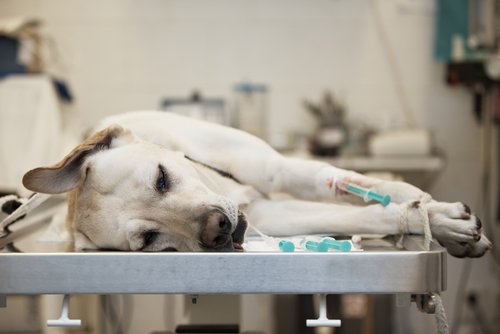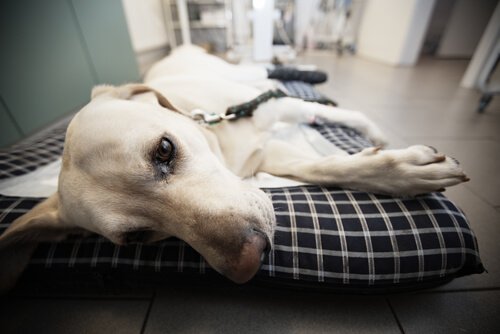When Should You Say "Yes" to Euthanasia?


Written and verified by the lawyer Francisco María García
Euthanasia, which is only advice by the veterinarian, is known as putting a dog to sleep. It is often one of the most painful situations for any pet owner. Chronic and serious illnesses are the most common causes for needing to resort to euthanasia. These intense diseases are the come from a dog’s old age, etc.
Emotional crisis due to euthanasia
For owners of sick or elderly animals, euthanasia may cause very intense feelings of guilt and sadness.
Some of the most frequently asked questions are: Is putting my dog to sleep the right thing to do? Will he suffer? Should I be with him when it happens? Am I allowed to take his remains after his death? How will I be able to get over the death of my pet?
Important points

The first thing to keep in mind is that when the veterinarian suggests the possibility of euthanasia, it’s because they are certain that the dog is suffering and he is about to pass away. This is the most important point.
The quality of life of an animal, that is sick or has serious physical problems due to old age, decreases significantly. In some cases, the dog is unable to walk, goes to bathroom inside the house, has intense pain, or becomes blind and deaf.
In similar situations, the most important thing to do is to prevent your pet from suffering. Therefore, you shouldn’t feel guilty for wanting the best for your dog, even if it’s a very difficult and painful decision.
Doubts about the animal’s suffering while undergoing euthanasia
The term “euthanasia” comes from Greek and it means “good death.” As you can see, its purpose is to prevent the dog from experiencing pain and suffering.
Therefore, the euthanasia process will not cause the animal any pain. He will fall asleep naturally and peacefully. At the same time, there are even techniques that keep the pet from feeling the prick of the needle when injecting the substance for euthanasia.
The owner’s company
Even if it’s very painful for the owner, it is important that the dog does not feel alone during his final moments. Even though he won’t feel any pain or suffering, you should keep in mind that he is in a strange place– the veterinarian’s office– where many dogs are nervous.
Therefore, the owner’s produces peace and serenity to the pet. The dog is unaware that he is going to be put to sleep, but he could be afraid that he is going to get hurt. It’s recommended to accompany the dog during his final moments to prevent him from feeling alone.
In regard to the owner’s feelings, it is important to say goodbye to your dog and feel like you’re were there during his final moments. That way it will be much easier to get over the dog’s death. An owner would be better off witnessing their pert didn’t suffer when dying, and had a peaceful.
The animal’s remains
The owners can take the animal’s body with them so they can bury and pay tribute to him. Even if it seems like a very simple act, it helps get over the loss of your pet. Some veterinarian offices offer the option of cremating the animal’s body and delivering the ashes to the owner. Town halls may also cremate animals.
Getting over the death of our pet

The death of a loyal friend, like a dog, leaves a mark on the people that experience it. Sometimes, there are people who live 16 years with their pet. This is a long journey full of experiences in which a strong friendship was created.
Feeling sad, depressed, and a lack of appetite is normal for a person who’s grieving the death of his/her dog. These feelings are part of getting over your dog’s death.
In every case, people grieve the death of their loved ones (including pets) in different ways. The time it takes to grieve a dog’s death may vary among people. Some people need more time than others in order to go back to their normal life and not feel sad.
Euthanasia, which is only advice by the veterinarian, is known as putting a dog to sleep. It is often one of the most painful situations for any pet owner. Chronic and serious illnesses are the most common causes for needing to resort to euthanasia. These intense diseases are the come from a dog’s old age, etc.
Emotional crisis due to euthanasia
For owners of sick or elderly animals, euthanasia may cause very intense feelings of guilt and sadness.
Some of the most frequently asked questions are: Is putting my dog to sleep the right thing to do? Will he suffer? Should I be with him when it happens? Am I allowed to take his remains after his death? How will I be able to get over the death of my pet?
Important points

The first thing to keep in mind is that when the veterinarian suggests the possibility of euthanasia, it’s because they are certain that the dog is suffering and he is about to pass away. This is the most important point.
The quality of life of an animal, that is sick or has serious physical problems due to old age, decreases significantly. In some cases, the dog is unable to walk, goes to bathroom inside the house, has intense pain, or becomes blind and deaf.
In similar situations, the most important thing to do is to prevent your pet from suffering. Therefore, you shouldn’t feel guilty for wanting the best for your dog, even if it’s a very difficult and painful decision.
Doubts about the animal’s suffering while undergoing euthanasia
The term “euthanasia” comes from Greek and it means “good death.” As you can see, its purpose is to prevent the dog from experiencing pain and suffering.
Therefore, the euthanasia process will not cause the animal any pain. He will fall asleep naturally and peacefully. At the same time, there are even techniques that keep the pet from feeling the prick of the needle when injecting the substance for euthanasia.
The owner’s company
Even if it’s very painful for the owner, it is important that the dog does not feel alone during his final moments. Even though he won’t feel any pain or suffering, you should keep in mind that he is in a strange place– the veterinarian’s office– where many dogs are nervous.
Therefore, the owner’s produces peace and serenity to the pet. The dog is unaware that he is going to be put to sleep, but he could be afraid that he is going to get hurt. It’s recommended to accompany the dog during his final moments to prevent him from feeling alone.
In regard to the owner’s feelings, it is important to say goodbye to your dog and feel like you’re were there during his final moments. That way it will be much easier to get over the dog’s death. An owner would be better off witnessing their pert didn’t suffer when dying, and had a peaceful.
The animal’s remains
The owners can take the animal’s body with them so they can bury and pay tribute to him. Even if it seems like a very simple act, it helps get over the loss of your pet. Some veterinarian offices offer the option of cremating the animal’s body and delivering the ashes to the owner. Town halls may also cremate animals.
Getting over the death of our pet

The death of a loyal friend, like a dog, leaves a mark on the people that experience it. Sometimes, there are people who live 16 years with their pet. This is a long journey full of experiences in which a strong friendship was created.
Feeling sad, depressed, and a lack of appetite is normal for a person who’s grieving the death of his/her dog. These feelings are part of getting over your dog’s death.
In every case, people grieve the death of their loved ones (including pets) in different ways. The time it takes to grieve a dog’s death may vary among people. Some people need more time than others in order to go back to their normal life and not feel sad.
This text is provided for informational purposes only and does not replace consultation with a professional. If in doubt, consult your specialist.








